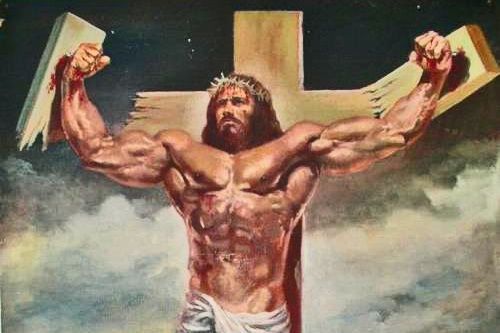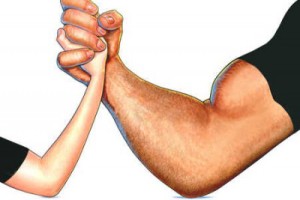So far on this blog we’ve had some discussion led by Ryan about how the biblical manhood movement (mis)uses statistical cultural analysis when applying it to the Church (For the relevant posts in the 6-part series: #1, #2, #3, #4, #5, #6). I do not intend here to pick up the discussion further, or to write multiple posts on the topic of Complementarianism vs. Egalitarianism. Rather I am concerned with the way Christians talk about manhood. Hoping to avoid generalization, I will say up front that this critique does not apply to everyone in the biblical manhood movement. However, I do intend to express some concerns. It appears to me that in an effort to avoid allowing the egalitarian shift in culture to influence how the Bible is interpreted, some Christians have done a bit of their own cultural imposition; namely, by beginning their quest for understanding manhood as taught in the Bible with a culturally defined understanding of what it means to be a man. Thus, it is an essential issue of prolegomena to define what it means to be a man before ever addressing the biblical witness about the roles of men and women in marriage and the Church. For this post I am only concerned with prolegomena, and I will be more concerned with what manhood isn’t than with what it is.
Of course, how we conceive of manhood has implications for what he think about Jesus. From the main picture of this post it is obvious that some Christians have come to conceive of Jesus Christ as manly or macho (note the words at the bottom: “Bench Press This”), since they assume that a ‘real man’ likes certain things (e.g. working out) and dislikes other things (e.g. musicals). There are expressions of this in various stripes. One pastor from the Southern United States was recorded preaching a hilarious sermon on why Jesus wore pants instead a dress! Besides the silliness of the cultural ignorance and historical anachronism regarding the relationship between manhood and pants-wearing, the most extreme statement that I’ve come across in regards to importing modern conceptions of MANhood onto Jesus come from pastor Mark Driscoll. Note his words from Relevant Magazine:
There is a strong drift toward the hard theological left. Some emergent types [want] to recast Jesus as a limp-wrist hippie in a dress with a lot of product in His hair, who drank decaf and made pithy Zen statements about life while shopping for the perfect pair of shoes. In Revelation, Jesus is a pride fighter with a tattoo down His leg, a sword in His hand and the commitment to make someone bleed. That is a guy I can worship. I cannot worship the hippie, diaper, halo Christ because I cannot worship a guy I can beat up. I fear some are becoming more cultural than Christian, and without a big Jesus who has authority and hates sin as revealed in the Bible, we will have less and less Christians, and more and more confused, spiritually self-righteous blogger critics of Christianity.
To be fair, Driscoll has good intentions with this quote, and some of it should be salvaged (primarily the last sentence). But there is an incredibly problematic idea at work here. The idea is this: since Jesus was a man, he was a MAN. There is admittedly an opposite tendency in some artistic renditions of Jesus which focus on his meekness (perpetuated by the way we talk about ‘baby Jesus’). Yet it is unfathomable to suggest, as Driscoll does here, that worship of Jesus is contingent upon whether or not one would be able to beat him up. Frankly, Jesus was beat up. Our Christian faith is based upon a proclamation which is centrally focused on the death of our God. Jesus was the man of sorrows; likened unto someone that people would hide their faces from (Isa 53.3). We often respect and (for the ladies) are attracted to men who are tall, strong, have a full head of hair, straight white teeth, etc. But Jesus was a 1st century Jew, so isn’t it likely that he was short? Since the ability to maintain good hygiene wasn’t as available as it is now do we assume that he was always healthy? What if Jesus’ teeth weren’t white, or worse, what if some were missing? As a carpenter, do we suppose that he was particularly buff? Now, the point of these questions is not to reconstruct the historical Jesus, but rather to remind us that we do not worship Jesus as the Son of God because he was a MAN, but because he emptied himself to become a man.
Therefore, when attempting to address what the Bible says about manhood, let us avoid importing categories from modern culture. There are no two males that are exactly the same; we have various preferences for all sorts of things. I believe that it is in fact damaging to perpetuate the cultural myth that manhood equals MANhood. If this persists it will undoubtedly create identity and personality crises among male members of the Church. Thus, our view of manhood must not be so rigidly defined. Though it may seem counter-intuitive, manhood must be flexible enough to include Paul’s theology of weakness (2 Cor 4.7-12; 6.1-10; 11.16-29; 12.9-10), and fluid enough to incorporate maternal images of leadership, protection and care (Gal 4.19; 1 Thess 2.7-8); which is also part of God’s self-revelation of himself (Num 11.12; Deut 32.18; Ps 131.2; Job 38.8, 29; Prov 8.22-25; Isa 42.13-17; 45.9-11; 46.3-4; 49.14-18; 66.12-14; Hos 11.1-3; Mt 23.27; Lk 15.8-10; 1 Pet 2.2-3).





22 Comments
Leave your reply.